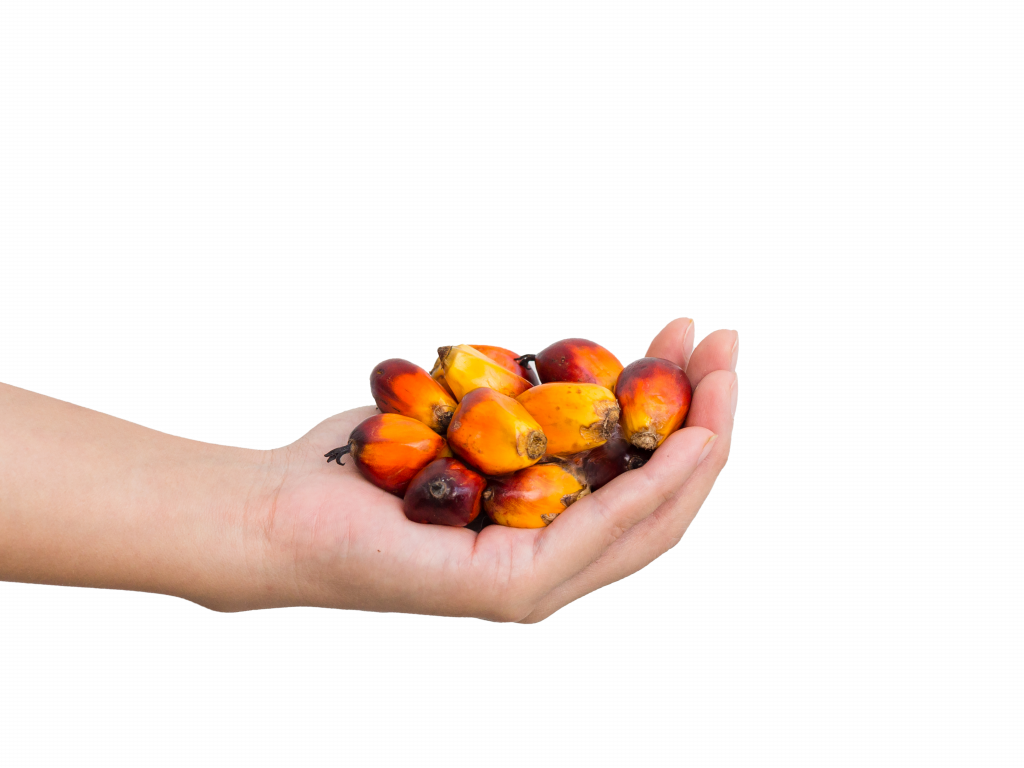Palm the
Superfruit
SUPERIOR
ADVANTAGES
Originated from West Africa 5000 years ago, the palm oil became an essential agricultural crop since the 14th century due to its robust year-round production. The oil palm has the highest yield per acre of any oil seed crop.
The water-soluble nutrients of the fruit also have a variety of applications from cognitive health and sports nutrition to healthy aging.
Aside from being a good food source, the palm oil is used throughout consumer goods industry such as pharmaceutical, cosmeceutical, pet food, functional foods as well as biofuel.

SUPERIOR
ADVANTAGES
Originated from West Africa 5000 years ago, the palm oil became an essential agricultural crop since the 14th century due to its robust year-round production. The oil palm has the highest yield per acre of any oil seed crop.
The water-soluble nutrients of the fruit also have a variety of applications from cognitive health and sports nutrition to healthy aging.
Aside from being a good food source, the palm oil is used throughout consumer goods industry such as pharmaceutical, cosmeceutical, pet food, functional foods as well as biofuel.
Inside Palm Fruit Oil
INSIDE PALM FRUIT OIL
50%
Saturated Fatty Acids (SFA)
SFAs are mostly palmitic acids, which makes palm oil more stable to lipid oxidation compared to other oils (like sunflower oil, olive oil, avocado oil), enabling fat-containing food to last longer and prevents rancidity. It also help maintains cell function in human bodies.
40%
Monosaturated Fatty Acids (MUFA)
MUFAs are formed entirely of oleic acid, which can suppress the over-expression of HER2 which is a key oncogene in the development of several cancers such as breast, ovarian, and stomach cancer.
10%
Polyunsaturated Fats (PUFAs)
Linoleic Acid is a polyunsaturated omega-6 fatty acid. It plays a special role in support of heart health. Randomized clinical trials have shown that replacing saturated fat with linoleic acid reduces total and LDL cholesterol. There is also some evidence that linoleic acid improves insulin sensitivity and blood pressure.
The rest of the small bits
but even better stuff
Phytosterols
Phythosterols are another phytonutrient group containing cholesterol-lowering component such as β-sitosterol
Vitamin E Tocotrienols
Due to its molecular structure, Tocotrienols are better than tocopherols in scavenging free radicals and therefore, have 40-60% more antioxidant activity than tocopherols
Ubiquinone (Coenzyme Q10)
Enhances production of cellular energy and has anti-oxidative defense mechanisms. Likewise, Ubiquinone provides cardio-protection and has anti-cancer properties.
Phenolic Acids
Work as antioxidants preventing cellular damage due to free-radical oxidation reactions and are readily absorbed through the walls of intestinal tract. Supports healthy ageing along with heart and cognitive health.
Lycopene
Antioxidant properties help keep radical levels in balance. Additionally slows down the growth of breast and prostate cancers. Reduces risk of developing or prematurely dying from heart disease. Also offers some protection against the damaging effects of the sun.
Carotenes
Commonly implemented in skincare for its ability to protect against UVA-light induced damage. It can help reduce levels of oxidative stress and contribute to the overall enhancement of skin appearance.
It has 15X more carotenoids compared to carrots. Offers anti-cancer activities and prevent night blindness.
Squalene
Squalene provides cardio protection and inhibits cholesterol synthesis. It also has anti-cancer properties alongside with radioprotection from radiations.
Phytosterols
Phythosterols are another phytonutrient group containing cholesterol-lowering component such as β-sitosterol
Vitamin E Tocotrienols
Due to its molecular structure, Tocotrienols are better than tocopherols in scavenging free radicals and therefore, have 40-60% more antioxidant activity than tocopherols
Ubiquinone (Coenzyme Q10)
Enhances production of cellular energy and has anti-oxidative defense mechanisms. Likewise, Ubiquinone provides cardio-protection and has anti-cancer properties.
Phenolic Acids
Work as antioxidants preventing cellular damage due to free-radical oxidation reactions and are readily absorbed through the walls of intestinal tract. Supports healthy ageing along with heart and cognitive health.
Lycopene
Antioxidant properties help keep radical levels in balance. Additionally slows down the growth of breast and prostate cancers. Reduces risk of developing or prematurely dying from heart disease. Also offers some protection against the damaging effects of the sun.
Carotenes
Commonly implemented in skincare for its ability to protect against UVA-light induced damage. It can help reduce levels of oxidative stress and contribute to the overall enhancement of skin appearance.
It has 15X more carotenoids compared to carrots. Offers anti-cancer activities and prevent night blindness.
Squalene
Squalene provides cardio protection and inhibits cholesterol synthesis. It also has anti-cancer properties alongside with radioprotection from radiations.
Sustainable
Production
Efficiency
Oil palm trees produce on average 10 tonnes of fruit per hectare – much more than other major oil producing crops. This means that palm oil requires 10 times less land.
Sustainable Palm Oil
RSPO has become the globally recognized standard for sustainable palm oil.
Versatility
Palm oil demand continues to grow because it is the most versatile of all vegetable oils. This is because palm kernel oil can be processed to form a wide range of products from functional foods to cosmeceutical and many more.
Palm oil’s highly stable composition makes it the best choice for culinary purposes. It does not release carcinogens compared to other vegetable oils and it also does not go rancid easily.
Palm oil is as healthy as virgin olive oil for heart health. The sn2 hypothesis which postulates that lipid in blood affecting cholesterol is affected by the position of the fatty acid in the fatty acid chain rather than the total composition of fatty acids (saturated/unsaturated). So sn2 position of palm olein is the same as that of olive oil even though its high in saturated fat, hence still having the same effect on cholesterol or heart health.
REPLACEMENT
Current Vegetable based butter made from other oils require hydrogenation which creates unhealthy trans fat. With the use of Palm oil, it’s 50-50 composition of saturated and unsaturated fatty acids acts similarly to butter and is suitable for confectionery manufacturing without the need for hydrogenation.
INGREDIENT
Palm oil is an essential building block in the manufacture of cosmetic ingredients from lipstick to shampoo.
Palm oil can improve the loaf volume and oven spring.
Refined palm oil can be converted into methyl esters and directly used as a biodiesels.
FEED
Tocotrienols palm-oil extract, Oil Palm Phenolics

